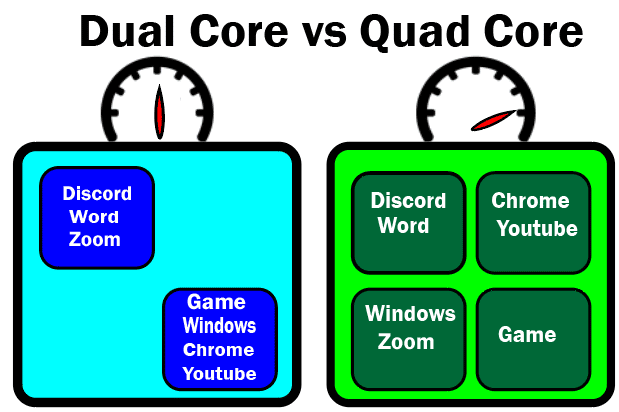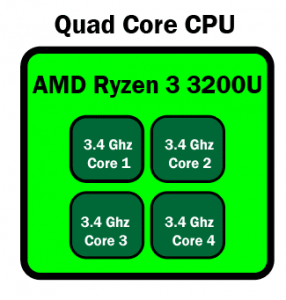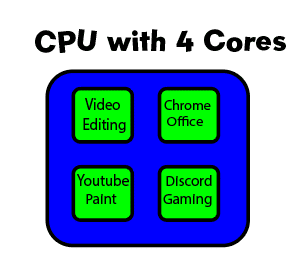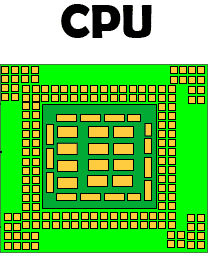Dual-Core vs Quad-Core: Which is Better for me?
I’m assuming you came cross two laptops or two desktops or maybe even two tablets with different processors:
One has a dual-core CPU and the other device has a quad core CPU. You want to know which one of these will best fit your needs.
Now….you may not even know what these terms mean.

I’ll just save you time and tell you RIGHT NOW to pick the device (computer, laptop or tablet) with four cores IF you can afford it because you’ll have an easier time running and launching several programs and apps simultaneously: youtube , word processor, a game, zoom, etc.
Sure a dual-core processor can do the same but everything will be slightly smoother with a quad core processor. It’s not just about #cores of though, performance also depends on RAM, graphics card and Storage (this may not be obvious).
Anyways, all things being equal, however (same specs across both computers) the quad core processor will give you significant improvements.
So there’s your answer.
The rest of this post we’ll explain in detail why this is the case and also answer:
- What is a core?
- What does dual-core mean?
- How exactly does the number of cores affect performance?
- If I want to run one single application (I don’t multitask heavily): Will my specific application , which is running alone, run faster with a quad core CPU?
[toc]
What is a CPU?
It’s not secret that this is the brain of a computer.
It’s in charge of “running” calculations and instructions basically running applications and software.
Every activity you perform from opening up a very large document to applying effects on a photo you want to edit CAN be done much faster IF you get a faster CPU.
Clock Speed
A faster CPU isn’t necessarily about the # of cores but rather about clock speed. The higher the clock speed, the faster applications will run.
What are Cores?

In the past CPUs were made of one big box which contained a single “chip” which was in charge of running and executing instructions.
Today, CPUs are not made out of a single “chip” but rather several “chips” which also go by the name of “cores”.
A core or chip can be said to be a “brain”. Thus the more cores you have, the easier , the faster it’ll be to calculate things as you have more than one brain to do so.
This is why a CPU that has more cores will ,depending on the application, outperform the CPU with less scores.
A application that runs faster with multiple cores is said to be “multi-threaded” or “multi-core”. Not every application is multithreaded. We’ll go through the applications which benefit from extra cores.
But as a general rule, a CPU with more cores can run more applications simultaneously much more efficiently and faster than a CPU with less cores. This also depends on the how many applications you are running and the kind of applications you run simultaneously.
We’ll get to specifics soon.
Multi-Core vs Non Multi-Core Apps
What makes an Application “Multi-Threaded”? Why isn’t every Applications Multi Threaded?
Before we go through the list of multi-threaded applications, it’s always useful to understand why some are and why some aren’t that way when a new applications or an application outside of this list arises you can make some guesses on whether or not is multithreaded.
Ex: 3D Animation requires stuff to render. Render means to output the final “3D model”. You can think of this 3D model as a PAINT.
Now if you only have one painter to finish this paint as opposed to several, it’s going to take you longer.
If you have several painters, you can assign a section of each paint to one single painter and do the same for the other sections. Thus PAINT a picture or 3D rendering is a multi-threaded task.
The same can be said about some tasks on Photo Editing, Video Editing and so on.
Non Multi-Core Applications
If the application or software requires things to be calculated one step at a time then you cannot work on the next step until the previous step is finished. Taking the painter’s example, let’s say these painters now want to build a ladder. It’s going to be the same whether you have one or several painters, as building a ladder is a bottom-up process.
Multitasking: Multi-Threaded ?

Each application can be assigned to one core as shown above. Thus if you’re the kind of person who likes to run YouTube , a word editor, discord, a game and a web browser with several tabs open you probably want the quad-core CPU.
A Quad-Core CPU is not a REQUIREMENT to run several applications, they’ll just run slightly faster.
A Dual-Core CPU can ALSO run several applications (thanks to a technology called Task Parallelism) which means even though you are running 4 or 5 applications simultaneously, they can all still run on TWO or even ONE CORE. The only difference is, the dual-core CPU will have some lag here and there.
Q: So which CPU to Choose? The one with more cores or the one with more clock speed?
Knowing that multiple cores isn’t really a requirement to multitask, this becomes a good question.
It’s tough to answer though but I would myself pick the CPU with the higher clock speed because I know Windows will run faster AND gaming too (which I often do).
Multi-Core Software List
Basic Software
- Discord
- MS Office: Excel, Word, Power Point…
- Zoom
- One Note
- Paint
- Simple games
- Chrome: Youtube, Web Apps, etc.
If you run any of these apps one by one , that is, separately, there’s no reason to choose a quad-core CPU. None of these apps take advantage of more than one core and in fact, since one core can run several apps simultanously and the fact that these apps are not hardware demanding, even a dual-core CPU will run all of these things FAST enough.
Animation & 3D Modeling
Drawing & Modeling
Applying effects and using the functions on the interfaces within these programs are not multi-threaded, they will run faster with the higher clock speed CPU. However, it is very unlikely you’ll get a dual-core CPU that’s faster than a quad-core CPU. Whatever you find, just pick the CPU with the highest clock speed.
Thus software like:
- Autocad 3D
- Revit
- Inventor
- Civil 3D
- SolidWorks
- Maya
- 3DS Max
- Blender
- Cinema 4D
- Rhinoceros
Are not going to run much faster with a quad-core CPU UNLESS that quad-core CPU has more clock speed than the dual-core CPU.
Exceptions
Some functions on some of these software are multi-threaded (Revit & Inventor), again those effects or functions that do not need steps to be calculated one at a time. You can head to the official site to check which functions they are and see if you’re going to use them on a regular basis. If that’s the case, then I would opt for an hexa-core CPU over both a quad-core.
Rendering
Rendering in 3D or 2D animation and 3D modeling is multi-threaded. Thus if you have a model that takes 30 min to render with a dual core-CPU, it’ll take 15 min with a quad core CPU.
Video Editing
- Final Cut Pro
- Adobe Premiere
- Lightworks
- SonyVegas Pro
- Corel VideoStudio
- iMovie
- AVS Video Editor
Likewise, all those effects and actions you do when you edit a video are not multi-threaded, they are “clock-speed” dependent. Thus you must always choose the CPU with the highest clock speed if you want to speed up your workflow here.
Rendering, Encoding, Previews
If your workflow relies a lot on rendering, encoding and previews then more cores is going to make things run faster. Current benchmarks show that these tasks benefit from multiple cores up to six cores. Anything beyond doesn’t offer any significant gains for you to spend the extra money (thus it’s okay to settle for six cored CPU if you can’t afford 8 core CPUs).
Photo Editing
- PhotoShop
- Lightroom
- Adobe Illustrator
- InDesign
There are only a few effects which benefit from multiple cores but they’re so few and specialized and the gains are minimal it may not be worth paying for the extra cores. On the other hand, all of these actions are HIGHLY dependent on clock speed too. Even small increases in clock speed can make a huge difference.
Music Production
- Ableton
- FL Studio
- Logic Pro
Since mixing and making music involves parallel editing, that is, you have to put several tracks next to each other, it is a multi-threaded activity. The more tracks and VSTs you use for making music (ex: vocals, guitar, piano, drums, etc, more sound effects) the faster applying effects will be with multiple cores.
Although each channel can be assigned to one core (thus having four cores will give you maximum speed to mix a work with 4 tracks) if the base frequency (clock speed) is too low it won’t keep up with the VST and plugins within each track. Thus if you want a super fast work, you want high clock speeds + multiple cores and always favor clock speed over number of cores if you can’t have both.
Programming
Long story short, programming is NOT a multi-threaded application even when you compile, it’s all about clock frequency. Now if we’re talking about parallel programming then it does become useful but not nearly as useful as having a dedicated GPU which has HUNDREDs of cores that parallel programming makes good use of
Thus dual core or quadcore, either one is fine, as long as you choose the CPU with more clock speed which will reduce the time it takes to compile, launch an iDE and emulators.
Virtualization: Running VMs is multi-threaded. If each VM is assigned to 1/2 a core, everything will run smoothly. So if you just want to launch 1 VM (say Linux), you don’t need a quad core. A dual core is going to be just fine. If you want to launch several VMs for testing purposes (simultanously) then yes you want that quad core CPU.
Gaming
Because gaming is based on synchronization basically running calculations one step at a time as we described before , it’s not going to be multi-threaded. No matter what you read on the official site of your favorite AAA game, clock speed will be the number of factor behind high perforance when it comes to choosing a CPU.
Now while it’s true that multiple cores help a little bit, it’s not going to help as much as clock speed will so you must always choose the high clock speed CPU over the high core count CPU that means picking up the dual core if it’s got more clock speed than the quad core.
Comments?
If you’ve got any questions or suggestions please leave me a comment below.
Author Profile
- I am physicist and electrical engineer. My knowledge in computer software and hardware stems for my years spent doing research in optics and photonics devices and running simulations through various programming languages. My goal was to work for the quantum computing research team at IBM but Im now working with Astrophysical Simulations through Python. Most of the science related posts are written by me, the rest have different authors but I edited the final versions to fit the site's format.
Latest entries
 wowDecember 18, 20255 Best Laptops For World of Warcraft – Midnight & Classic (2026)
wowDecember 18, 20255 Best Laptops For World of Warcraft – Midnight & Classic (2026) LaptopsDecember 17, 2025The 4 Best Laptops For Virtualization of 2026 (10-50 VMs ATSM)
LaptopsDecember 17, 2025The 4 Best Laptops For Virtualization of 2026 (10-50 VMs ATSM) Hardware GuideDecember 17, 20252026 Beginner Guide to Reading Computer (Laptop) Specifications
Hardware GuideDecember 17, 20252026 Beginner Guide to Reading Computer (Laptop) Specifications LaptopsJune 30, 2025Best Laptops for Computer Science (July 2025 )
LaptopsJune 30, 2025Best Laptops for Computer Science (July 2025 )

